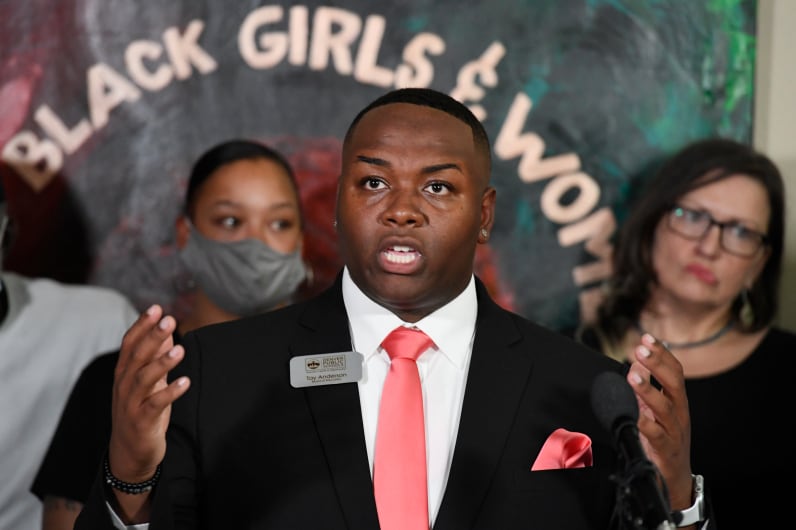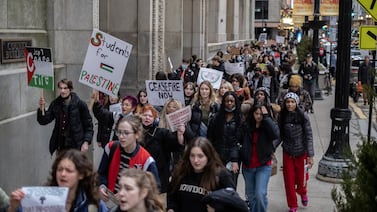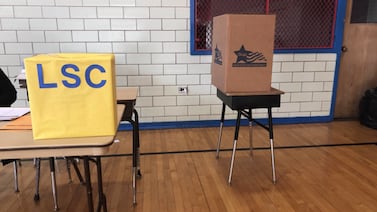Two months after a third-party investigator found that claims of sexual assault against Denver school board member Tay Anderson were unsubstantiated, Anderson has filed a lawsuit against people and organizations who made the sexual misconduct allegations last spring.
Anderson, 23, is suing the civil rights organization Black Lives Matter 5280 and four people associated with the group, which alleged in March that Anderson had sexually assaulted an unnamed woman. Anderson is also suing two other people, one of whom, Mary Katherine Brooks-Fleming of Denver, accused Anderson of more than 60 instances of sexual misconduct against other people without naming him directly.
The defamation lawsuit was filed Wednesday in Denver District Court and seeks damages of at least $1 million. In the lawsuit, Anderson said he lost out on job opportunities and earnings as an influencer and incurred significant legal expenses as a result of the accusations, in addition to the impact on his mental health and the well-being of his family.
In a statement Wednesday, Anderson said he believes in restorative justice — a process that focuses on repairing harm — but when that fails, “I am left with no choice but to take the necessary steps through legal action to clear my name and to do everything in my power to ensure our students feel safe in their schools regardless of which board member is present.”
The Denver school board hired Denver-based Investigations Law Group to look into the allegations. In September, investigators concluded as unsubstantiated the claim by Black Lives Matter 5280 that Anderson had sexually assaulted an unnamed woman.
Also unsubstantiated were claims by Brooks-Fleming that Anderson committed sexual assault or misconduct against 62 Denver Public Schools students.
Brooks-Fleming made the allegations while testifying before the Colorado House Judiciary Committee in May on a bill to allow underage victims of sexual misconduct to sue organizations. Brooks-Fleming did not name Anderson in her testimony, but the Denver school board released a statement saying Anderson was the subject of the woman’s allegations.
The lawsuit names Brooks-Fleming and four leaders of the Black Lives Matter group: Apryl Alexander, Ari Lipscomb, Amy Brown, and Michael Diaz Rivera. The lawsuit also names Jeeva Senthilnathan, a college student and recent candidate for Parker Town Council who made a Facebook post in October claiming knowledge of additional victims in the activist community.
In addition to alleging defamation, the lawsuit alleges the defendants conspired together to make false statements about Anderson and intentionally inflicted emotional distress.
On Friday, Senthilnathan issued a written statement in which she stood behind the claims in her Facebook video.
“This lawsuit is not only meritless, but it seems that its aim is to chill free speech by a citizen through abuse of judicial process,” she said.
The other defendants have not responded to Chalkbeat’s requests for comment.
Anderson remained on the school board during the investigation, though he did step back from most duties for a six-week period in June and July. After the investigation report was released in September, his fellow board members voted to censure him.
Even though the most serious allegations were unsubstantiated, Anderson’s fellow board members said other conduct uncovered by the investigation — including that he had flirtatious conduct with two high school students on social media — was unacceptable.
After the investigation was released, more than 1,000 Denver students walked out of school and demonstrated in front of district headquarters, calling for Anderson to resign.
In his statement, Anderson said he didn’t take the decision to sue lightly. But he said the unsubstantiated allegations have caused him harm, including lost job opportunities and a lost sense of safety for himself and his family, including his 7-month-old son. In addition, he said “the work of Denver Public Schools was sidelined” during the investigation.
“It pains me to once again bring attention to this traumatic experience, but I’m a victim of false allegations that almost took my life,” Anderson said. “I am hopeful that this process affords me the opportunity to find a path forward and to continue the work to heal our community.”
In the lawsuit, attorney Issa Israel writes that within months of the accusations, “the once sanguine and energetic young Anderson shrank into a dejected, listless version of himself struggling against the impulse to end his own life.”
Israel acknowledges the #metoo movement in the lawsuit and praises efforts to bring accountability to high-profile predators who previously went unpunished.
“Yet, in our fervor to hold these monsters responsible for their crimes, we have allowed a new kind of monster to emerge — one who in like fashion creeps in unawares beneath the cover of our fears and wreaks havoc upon the innocent,” he wrote. “Undoubtedly, plaintiff Tay Anderson is one such innocent.”
Editor’s Note: This story has been updated to include comment from Jeeva Senthilnathan.








